The Handmaid's Tale: Hell Hath No Fury
Warning: This article details the conclusion of The Handmaid's Tale franchise. The ending is powerful. You will thoroughly regret spoiling it.
Countless women have shaped the course of human history, but they rarely get the recognition they deserve. Men will steal their ideas, take credit for their accomplishments, and build giant statues of themselves. They'll hire scribes to write exaggerated stories about their greatness, and relegate women to the kitchen and bedroom where they belong.
Women will watch, helpless to right the wrongs that have been committed against them. When the entire world believes that you're inferior, imbalanced, and weak, there's no convincing anyone otherwise. It didn't make sense to get angry. That was simply the way things were.
But some women can't stay quiet. They won't be silenced. They're too powerful, too intelligent; they can't conform, and they shouldn't have to. Their stories often end in tragedy. There's runaway brides who wouldn't accept their station, concubines and slaves that wouldn't perform their duties. Many just wanted bodily autonomy--no unwanted sex, no forced marriages, no servitude. They weren't toys to be played with they were people, and when they asserted their rights, they were often killed.

Courtesy of Hulu
History hasn't been kind to women. They've been passed around, sold, and held captive. They were often treated like cattle. These aren't universal practices, of course, but it happened enough to take note, and women are almost always considered inferior. The Hebrews sold young girls into servitude; they forced them to marry their owners and executed anyone who had sex outside that marriage. In ancient China, they were completely incapacitated. They couldn't run because their feet were bound, and they couldn't use their hands because they never cut their nails. They'd live out their lives on a cushion with servants tending to their every need. They couldn't even feed themselves.
Only extraordinary individuals were capable of rising to the top in these societies. Aunt Lydia was one of those women. To many--including the showrunner Bruce Miller--she is the embodiment of the dread force we call Gilead. She has all of the disturbing qualities we associate with the regime. She's bigoted, misguided, cruel, and sadistic. She takes pleasure in her corrections; she doesn't mind gouging out eyeballs and removing hands. She'll hunt down women to maim, hoping to make an example for the other handmaids. There was no shame, just blind conviction. She truly believed that she was doing God's work.
But there's a level of prowess and authority behind everything she does. In The Testaments, she convinced everyone that she was a pillar of righteousness--a symbol for Gilead's founding principles. Her picture hung in the back of every classroom. Marthas would make up stories about her to scare kids, while aunts extolled her virtues. She even had a cult of personality. Devotees would come to Ardua Hall like pilgrims, leaving offerings at the foot of her statue. She wasn't the nation's leader of course, but she was the face of Gilead.
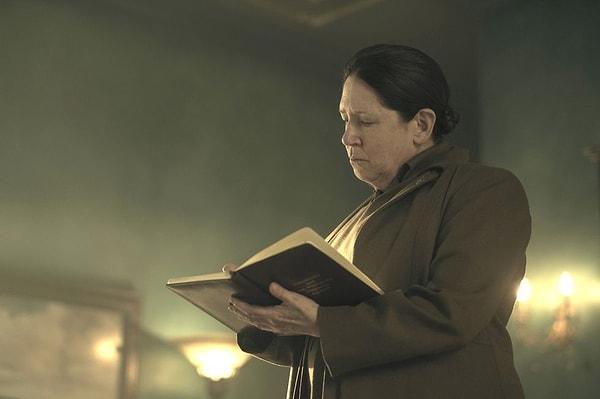
Courtesy of Hulu
Gilead wasn't the most misogynistic society that the world had ever seen. But they did have the largest infrastructure, a predatory slave economy, nationwide rhetoric, and brainwashing. Imagine the amount of patience and skill it must've taken for Lydia to transform herself into a national symbol while living in that world.
It began with the handmaids. In season four, when Lydia took back her place at the red center, she told the girls that they would never walk alone. They would be tested by wicked men, and when they were she would be there to listen to them. They would come to her when they were forced to have sex outside the ceremony. They'd tell her about beatings and all of the secrets they heard. Lydia collected this information and stowed it away, as did the other aunts who worked under her. This is where we get the term 'testaments.'
She managed to build a massive compendium of knowledge, which she could then use to blackmail commanders. She could have them removed from their positions, stripped of their possessions, jailed, and even executed, and they knew that. They also knew that if anything happened to her all of their secrets would be released. That is how she became one of the most powerful figures in Gilead.
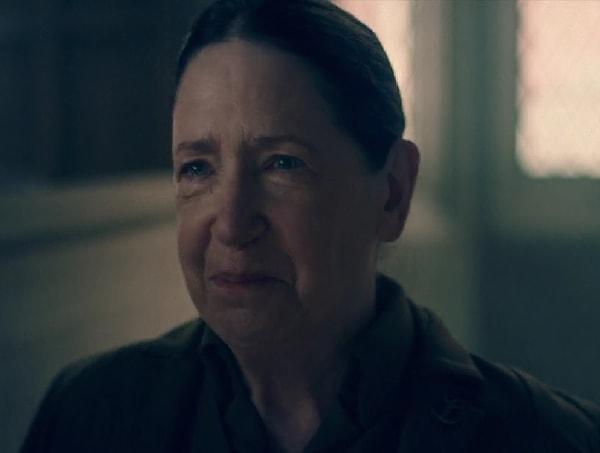
Courtesy of Hulu
Lydia's network of spies was impressive, but that's not what made her so extraordinary. Gilead was a giant power vacuum. There was no leader, just a collection of councils. It was a true republic, which meant that every twisted plantation owner and ambitious pastor in the country was scrambling to get to the top. They'd hire assassins, hold mock trials, and go on witch hunts. Purges were an everyday fact of life. Nearly everyone that gained a position of power was targeted, and they rarely survived.
Lydia made it through unscathed, and she did it with finesse. Nobody questioned her conviction. Nobody doubted her righteousness. She was too bullish, too stubborn, and she never strayed from orthodoxy. Everything she did--at least in the public eye--was by the book.
But beneath that brutish demeanor, she was harboring a white-hot flame. It was the embodiment of female vengeance, kept alive with visions of slavery and torture. She'd take part in the bloodshed and perform her duties, and yes, she did enjoy corrections. In The Testaments she said that she even believed for a time, but eventually she decided that enough was enough, and she dedicated her life to destroying the regime. She'd keep quiet, say all the right things, and internalize everything she saw. For decades she harbored this anger; she concealed it and fed it, allowing it to grow, until it became so powerful that it could conquer a nation. It was proof that she was a great mind--a rare gem born once in a generation. Not only did she manage to become a national symbol, she was also able to take down the regime. It's awe-inspiring, even after we consider her crimes.
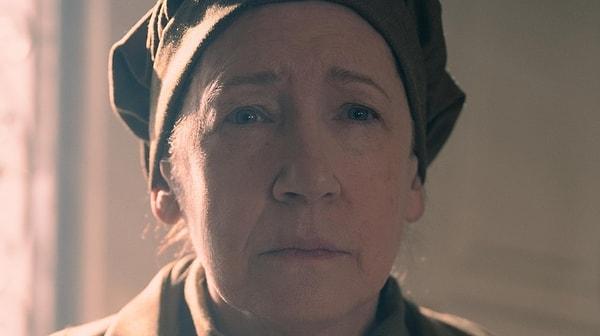
Courtesy of Hulu
A Tale of Two Titans
According to the showrunner Bruce Miller, the Lydia we know from the series is the same Lydia we read about in The Testaments. He doesn't feel like there is a difference, and in many ways, they are the same person. Both are brutish, like steamrollers, bursting into a room, boisterous, and matter-of-fact. They can move mountains when they yell, like a vicious schoolmarm determined to get control of their students. We know this woman. We can feel her intensity, whether we're reading her or watching her on screen. But there are distinct differences between the two Lydias, regardless of what Miller says, and they're difficult to ignore.
The Lydia from the series was a believer. She prayed before meals. She hated homosexuality and promiscuity. When she almost had sex on a date, she broke her bathroom mirror in a rage, ashamed of herself for giving in to her instincts. She also seemed to be a part of the movement created by the Sons of Jacob. Their main justification for the coup and the holocaust was the falling birthrate and the possible extinction of the human race. That mattered to her, which was why she was moved to tears when she realized that June was pregnant.
Lydia also seemed to have a habit of interfering in the lives of a certain type of woman--a stereotype that she'd built in her mind--someone who dated, had sex before marriage, and refused to conform to her conservative religious views. That mindset began long before Gilead took hold. In flashbacks, we saw her breaching ethics and insisting on taking one of her elementary school students home with her. She took his mother, Noelle, under her wing, hoping to coerce her into accepting Christ and giving up her string of lovers. When Noelle resisted, Lydia called child services. The most interesting part of the flashback was the way child services handled her report. Instead of conducting an investigation, they immediately removed the boy from the home--an obvious result of Gilead's infiltration of the system. They then visited the school to interview Lydia, where they asked if Noelle was going to church. It was wild, but Lydia didn't seem to think that anything was amiss. She also talked about how wonderful it was now that the system had been reformed because that meant they could intervene more often.

Courtesy of Hulu
Both Lydias spent time working in family law and as schoolteachers. But in The Testaments Lydia was working as a judge at the time of the coup. She was in the courthouse filing paperwork when a group of armed thugs burst into her office machine guns in hand. Commander Judd, one of the founding fathers, walked in behind them. He ordered them to bring her to a repurposed stadium where she was held captive, forced to sit all day in the sun, while she watched women in aunt uniforms take part in firing squads. When it was her turn, they brought her to a police station, locked her in a dark cell, beat her, and left her there.
It was textbook brainwashing, borrowed from the rise of communism in Asia. The idea is that when you break a person down, take away everything that they are, and force them into a state of desperation, their minds become a blank slate. You can fill their heads with all sorts of strange ideas--stories of demons and mythological creatures--anything, and they'll accept it. It's not universally effective. Some people are immune; others require more effort than most, but Lydia was so hurt by what had happened to her that she started to break down.
When Judd had her removed from her cell and placed in a hotel room, she was grateful, which was the goal. Gratitude makes torture victims impressionable and obedient. They're more willing to believe what they're told if it's coming from a source that they trust. Lydia did maintain some of her identity, but she stopped believing in liberty, democracy, and the ideals the United States was built on.
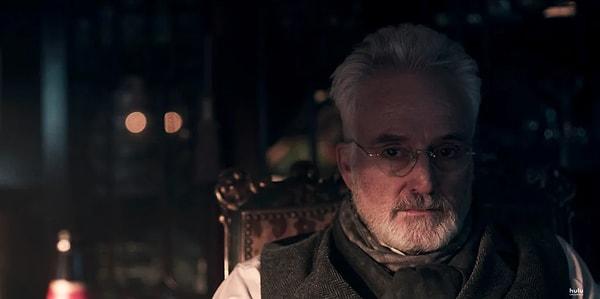
Courtesy of Hulu
In the eyes of a Gileadean fascist, humans are incapable of ruling themselves. In order to prosper and please the Lord, they need a government based on scripture and God's law, and someone with a firm hand to keep the masses in line. Lydia began to accept this message when she was introduced to Aunt Vidala, Aunt Elizabeth, and Aunt Helena. They were called the founding aunts, and they were tasked with building a separate, female sphere of government. The separation was Lydia's idea. She did not want men to rule over women. But she did believe in what they created--the window dressing, uniforms, prayers, and methodology. She was very proud of it. Judd took all of the credit for these things, and in fact, he was named as a mastermind in the first epilogue.
None of this happened in the Hulu series. Lydia didn't mind compromising liberty in favor of theocratic rule. She didn't have to come to a major revelation to believe in strict governance. She already believed that children should be raised by believers, and she didn't seem to think there was anything wrong with the changes Gilead was making behind the scenes. There were no founding aunts, either. We have met an Aunt Elizabeth, but she's only mentioned in passing. Aunt Helena and Aunt Vidala have not been named, and it's been made obvious that Lydia has nowhere near as much power as she did in The Testaments. The eyes were not banned from entering Ardua Hall, for example. She was stripped of her position after June and the other handmaids ran away. She was really just an ordinary aunt who was earning a reputation for herself.
It's likely that TV Lydia started out as a faithful protestant who attended church multiple times per week. It's easy to imagine her swaying back and forth, tears streaming down her face as she lifts her hands to God. She would lose herself in the music--tearful ballads and upbeat praise and worship tracks, all designed to pull her in and create the same malleability that Testament's Lydia experienced in her dark cell. Then sermons would come on, a well-dressed pastor shouting 'Praise Him,' and 'Isn't He good?' before going on a lengthy rant. This would be accompanied by a keyboard or a piano, meant to emphasize their message and drive it home. Women in her generation did attend church. They defined themselves by their denomination and the beliefs that were set out before them, and they shunned anyone who refused to go. This would've gone on for decades--her entire life, in fact--and it would've only gotten more intense as the Sons of Jacob infiltrated mainstream Christianity in America. They appeared on Christian broadcasting channels. They'd send out propaganda material--books and pamphlets, and they would spread their message throughout the many Christian colleges and universities that have become so popular as of late. Conservatives would do what they always do: Follow along and demonize anyone who resisted. Whether we are willing to admit it or not, this follows textbook brainwashing methodology. There was social reinforcement; her identity was tied to her beliefs, and they were backed up by the emotion necessary to blind her to reality--all because of tried and true tactics developed to reach congregations.
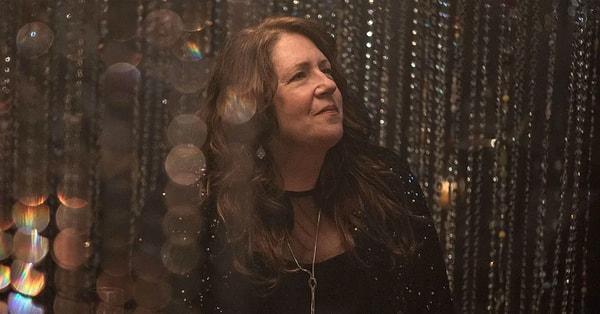
Courtesy of Hulu
When you're on the outside looking in, it's difficult to understand why people hold on to strange beliefs. There are still cultures that believe in monsters and mythical creatures, even Hollywood magick, and mind control. There's no limit to the absurdities we're willing to accept when everyone around us believes the same thing. It's because our moral code and our worldviews come from the rest of society, especially when we're young. In order to move past that, Lydia would've had to experience something powerful that she could not ignore. In the case of the TV series, it was love.
According to Ann Dowd, Lydia walked around with a set of blinders making it impossible for her to see the world around her. If something went against her narrow worldview, she'd ignore it or reject it. It's a common defense mechanism used by our brains to keep us from having to undergo a difficult transformation, and it can actually affect our ability to concentrate and read. When Janine entered the picture, and Lydia's love for her blossomed, those barriers fell. She couldn't let Janine get hurt. It wouldn't have been right, which meant that it wouldn't have been right to hurt the other girls either. And behind that hateful shell was an unbearable load of guilt. She knew what she was doing, and she knew that it was wrong, but she had believed that she was doing God's work for so long that she couldn't accept the truth.
One of Ann Dowd's most moving performances was in Janine's hospital room after the poisoning in season five. She fell down on her knees, shaking with silent sobs. She was so humbled by the experience that she could barely speak. That was when she vowed to change things, but it wasn't enough. People who have experienced brainwashing have trouble understanding right from wrong. They have no reference points, so counselors and people on the outside will have to guide them down the proper path. It takes time and dedication, and the process never fully works. Aunt Lydia will never move past Gilead's twisted thinking, even if she rejects it. She won't have anyone to help her, either--no psychologists, no support groups, just an entire nation filled with pretenders and believers. We might never see her gain a healthy outlook.
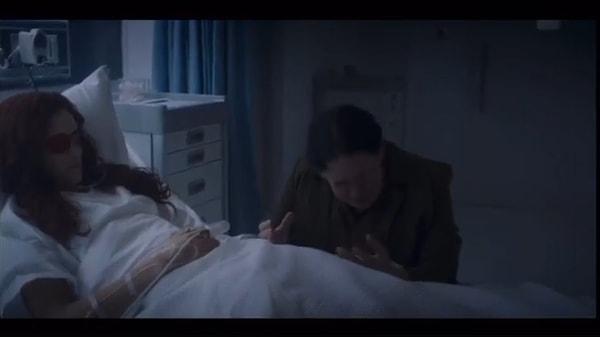
Courtesy of Hulu
Redemption
Many fans have spoken out about Aunt Lydia's redemption arc. She is guilty of every human rights atrocity imaginable. She's mutilated slaves and forced them into nonconsensual relationships, and there are times when she's actually mocked her victims. She did it when she chained Alma's hand to a lit stove. She didn't just believe in violence, she enjoyed it, and she'll probably never change. She may always believe in harsh discipline and 18th-century misogyny. Her crusade against the regime might center around corruption and purism. She might just get upset that Gilead strayed from its founding principles. So it makes sense that people would find themselves incapable of loving her. But nobody is asking us to love her. She will never fully be redeemed in the eyes of the audience.
Margaret Atwood knew this when she wrote The Testaments, and she addressed it consistently throughout the text. It was narrated by Lydia, who was sneaking a pen and some old paper, hoping to tell her story before she died. She asked the readers not to judge her. She knew that they may or may not know her crimes, but they'd definitely be aware of the crimes of the regime itself and that she had taken part in them. She was also aware that by that point, she might be considered a well-known name considering the part she played in governance. She admitted guilt. She talked about the things that she had done in her youth and the anger she'd spurred up over the years. She thought that one day a group of revolutionaries would parade her head around the streets, and they would've been right to do so. She understood, and she herself has a lot of guilt about the things she had done.
This new story will require us to recognize her crimes and still find a way to connect with events as they unfold. We don't have to love her. We're not being asked to do so. Her fate won't matter to us. It will already be written in stone. But she will have direct control over the fate of people that we love dearly. She'll fulfill a wish that we've had for decades. She'll do something spectacular, and she will prove herself to be one of the most powerful figures in her generation. That might be enough to change minds, and it might not. But you don't have to like her to enjoy the story.
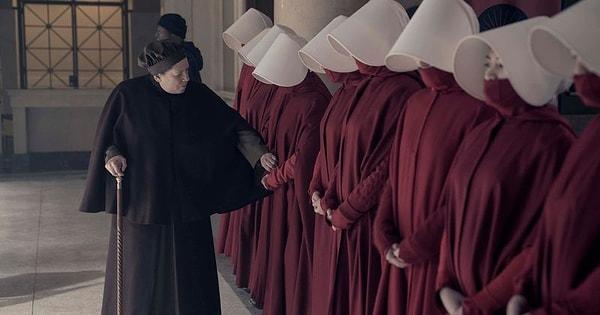
Courtesy of Hulu
Parallel Universes
We think we know these stories. We've seen the path that Lydia must take, and we're certain where it leads. But don't let The Testaments fool you. Bruce Miller has made it very clear that he doesn't plan on following the book. Margaret Atwood's sequel was a continuation of her first novel; the new spin-off will be a continuation of the television series. It will match the show, its plot changes, and the wonderful journey we've gone on for the past five years. There's so much that has happened since June was first arrested by the eyes at the end of season one, and none of it was addressed in the second novel. That won't be possible with the spin-off.
Bruce Miller will be making extensive changes. That will likely include June's role in the spin-off, Lydia's backstory, and Hannah's outlook, and we probably won't come to the revelation that Lydia has been running her own separate sphere of the government all along. That means the ending isn't safe. She may or may not play the same part in it.
We do know that they are beginning to delve into her character development. The Lydia that we met in season one is not the Lydia we saw crying in season five. She believes in compassion now, and she's furious with the regime. She's also gathering testaments to use against them. That might mean that things will end the same way. But don't jump to conclusions yet. That question won't be answered for several years.
Moving Forward
We are about to witness the rise of an extraordinary figure, capable of taking on the men who toppled history's most powerful military. They had more blood on their hands than anyone who has ever lived, and she had them exactly where she wanted them. It's inspiring.
She's already quite powerful. She might not have fully come into herself, but with a single whisper, she could have the architect of Gilead's economy executed. She has dirt on the commanders in her local district, and she is a beast when she doesn't get what she wants. Now that she knows she is nothing more than just a glorified madam, she will see changes. She will not stop until her girls are safe, and if that means burning the nation to the ground, she will do it.
When season six starts, she will almost certainly contact Commander Lawrence, just like she said when they dragged Janine away. He knows that she has dirt on him, and she will use it if it means she can save Janine's life. We will also see her asserting herself more. Her reforms will probably start with the Pearl Girls, a group of missionaries who acted as a covert spy network. Aunts in training would finish their studies and a period of harsh labor, and then they'd be sent abroad to bring back a convert--a pearl of great price. If Janine makes it back to the red center, she will likely be the first to be sent out. There has been some skepticism about this because of Janine's eye. Fans think that Gilead would never send out a missionary who has been maimed. It would look bad. But come hell or high water, Lydia wouldn't miss a chance to help her escape, and the Pearl Girls are perfect for human smuggling. The show also made a point to emphasize that Lydia doesn't want the eyes in the red center. That will probably change as well. In The Testaments, they were required to ask her permission first. Her interactions with Commander Lawrence seem quite important for her redemption arc. Some have speculated that he is Commander Judd with a name change and an altered backstory. In The Testaments, he took credit for Lydia's Pearl Girl idea to cover up for a failed settlement he created--sort of like New Bethlehem, only it was built to enact a quiet genocide. We will probably see this happen when New Bethlehem falls.
Keşfet ile ziyaret ettiğin tüm kategorileri tek akışta gör!

Send Comment